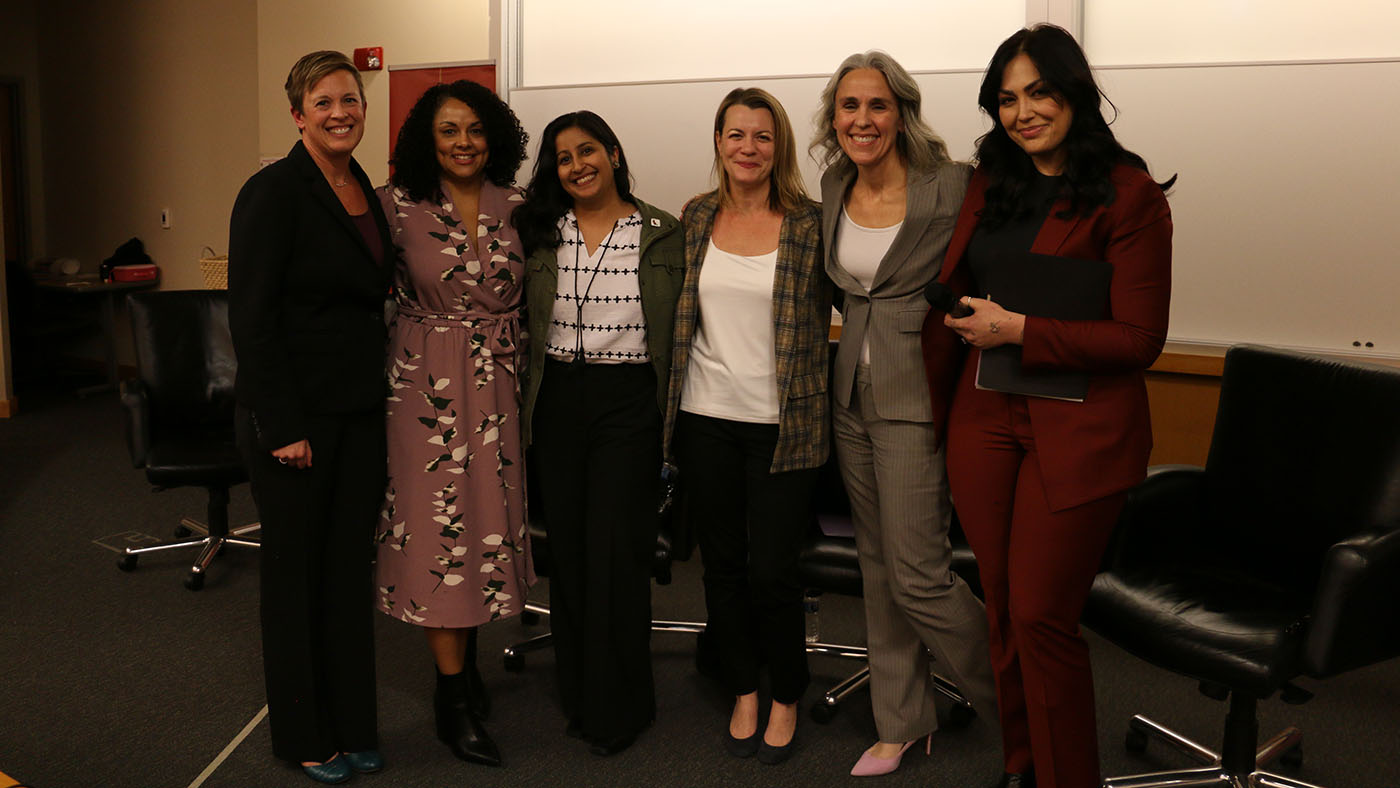Seattle University School of Law celebrated the installation of Brooke D. Coleman as the Fredric C. Tausend Professor of Law, named for a former Seattle U Law dean and professor. The title was first established in 1994 to honor a Seattle U Law faculty member for their scholarly pursuits, teaching ability, and service work.
Coleman commemorated the occasion by assembling an all-women panel of Seattle U Law alumni for a discussion titled, “Showing Up: A Celebration and Discussion about Taking Action, Leading Authentically, and the Power of Mentorship," created as a nod to the way Tausend “showed up” for his students, colleagues, and clients.
“The theme for this evening was inspired by the legacy of Fredric C. Tausend, an esteemed lawyer, colleague, professor, and dean at Seattle U Law, who was known among our community as an advocate and mentor,” said Dean Anthony E. Varona, who selected Coleman for the professorship, in his opening remarks.
Coleman, who is vice dean for academic affairs, is a nationally recognized expert in civil procedure who has been published in a variety of prominent law journals. Varona called her “one of the most cited scholars on this faculty” and a “superstar.”
“Brooke is a trusted coach, advisor, and champion to her faculty and staff colleagues, she is a leader and cherished colleague across our university, she is a master teacher, she is a beloved mentor and guide to her students,” Varona said. “She is, in short, everything and more a dean would want in a colleague and top deputy.”
The panel consisted of: Sarah Elerson ’12, founder of Elerson Law, PLLC; Kiran Griffith ’13, a partner at Stoel Rives LLP; Joan Miller ’12, CEO of the Washington Council for Behavioral Health; Kasha Roseta ’14, associate director and program attorney at the Office of the Superintendent of Public Instruction’s Equity and Civil Rights Office; and Maria Wiederkehr ’21, a deputy prosecuting attorney with the King County Prosecuting Attorney's Office.
“I wanted to pay homage to the people in this room who have been my mentors along the way — so many of you in here who have given me so much in my career — and also to celebrate my students and alums,” Coleman said.
The panelists defined “showing up” in a variety of ways, including supporting those who have experienced trauma, having the courage to ask for help, being authentically oneself (especially as a person of color), and admitting to one’s mistakes.
“It is having the courage to embrace your fear and act anyway, because every opportunity is a way to impact someone else and effect change,” Griffith said.
Roseta added that showing up is “when we all bring our gifts to the table and combine them.”
Before becoming vice dean for academic affairs this year, Coleman served as special assistant to Natasha Martin, Seattle University’s vice president for diversity and inclusion. She also previously served as associate dean of research and faculty development.
Prior to joining the faculty of Seattle U Law, Coleman was a Thomas C. Grey Fellow at Stanford Law School. She also clerked for Judge David F. Levi, district judge in the Eastern District of California and then-chair of the Standing Committee on the Federal Rules of Practice and Procedure. Before her clerkship, she practiced as an attorney at two law firms: Wilson Sonsini Goodrich & Rosati, and Gunderson Dettmer Stough Villeneuve Franklin & Hachigian, both in Palo Alto, California.
Coleman’s writing has been published in the New York University Law Review, Northwestern University Law Review, William & Mary Law Review, Boston College Law Review, Indiana Law Journal, and Cardozo Law Review. She is the co-editor of an anthology of critical legal perspectives, “A Guide to Civil Procedure: Integrating Critical Legal Perspectives,” and the lead author of an innovative civil procedure casebook, “Learning Civil Procedure.”
Tausend led the law school as dean from 1980 to 1986 and is widely credited with strengthening the school’s commitment to social justice, academic excellence, and access to legal education, as well as diversity in education and the profession. The professorship was previously held by Professor Emeritus David Skover, who retired in 2022.

